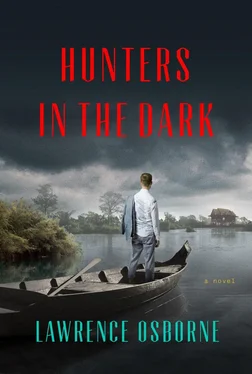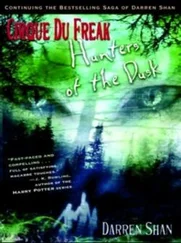She raised herself up and realized that now he was asleep and noticed nothing. She whipped the screwdriver up high and then plunged it straight down into the back of his neck. She put so much force into the blow that there was no struggle. He gasped and stirred and before he could wake she had struck a second time and with even greater ferocity. His blood rushed up out of the two wounds and she straddled him and raised the screwdriver once more. This time with both hands, driving it into his neck as far as she could. His whole body shook like a pig impaled.
The moths in the next room still beat against the shutters. When she was exhausted in her own right she rolled off the squalid body and sank onto the floor for a while. She had already decided that it was all the result of Simon’s karma and of her own, and it was all foreordained. Against the unleashed consequences of karma one had no defense. The circle of samsara was mostly fixed; there was no liberation. Events piled up against each other like logs being thrown onto a pile. She would meet Davuth in a future life and with luck he would be a fly and she would be a gecko chasing him down and eating him. If, that is, she was lucky. She might not be lucky. The seeds laid by any given karma were not entirely known, the outcomes could not be foretold with any accuracy and it was likely, in any event, that one would remain floating and turning within the circle of eternal suffering.
She left the screwdriver on the bed after wiping down the handle and took — with a slow deliberateness — a cold shower to wash herself down. She felt nothing at all. She washed her hair and her fingernails scrupulously. She felt she was honoring her dead lover.
In the main room she got dressed without getting a spot of blood on her. Now the moths had stilled and there was a taste of dawn in the air. The Mansions were about to stir with weary life. She saw at once the bag that he had packed, stowed next to the bed. Inside it was her and Simon’s money, and the two passports. For a moment she was blindly elated and triumphant, and spotted too the amulet which Davuth always wore to protect himself and which, crucially, he had neglected to wear as he went to bed for his pleasures. It was the one thing she would leave untouched and it was surely fate that had made him forget it. If he had been wearing it the screwdriver would never have pierced, he would have sensed her intentions. The thought made her shudder finally. He had hunted her, and them, and now she had hunted him. Yet neither had really been hunting the other. There was another key on the table in the main room, with an apartment number tag attached, and she took it.
When she was finished she took hold of the bag, went over the room again carefully and then slipped out into the corridor, locking the door with the push button in the handle. The cleaners were scraping the surface of the pool below with nets. They did not look up. She went down to the apartment number on the key and opened the door and went in. This unit was plunged in darkness and she had to reluctantly turn on one of the lights. The place had obviously been ransacked, the floors strewn with damaged toiletries, and the violence of the pillage appalled her. She began to understand how the English boy had been wronged. First by them and then by Davuth. And who, in the end, had he harmed to deserve such a thing?
On the way down to the room she had still been sure of her intention, to run with the money after leaving the passports in Robert’s room as a small atonement. But when she opened the bag now and looked at the notes she felt that this was the wrong plan and had been all along. The disaster had happened because they had taken something that was not theirs. Recall, then, the first night after she and Simon had fled. They had stopped in a village by the river and the ever-superstitious Simon, who believed in Khmer folk magic far more than she did, insisted that they visit a fortune-teller together, a haor teay. He took with him one of the dollar bills from the stash and asked the man to look at it and “read” its future.
The haor teay lived alone in a hovel by the water. They sat together at dusk among the rubbish and reeds. Simon was slightly delirious and obsessed. He kept telling her that the money might be jinxed, it might be cursed by spirits and he wanted to find out if it was. He considered going to a rup arak to see if it could be connected to someone who was already dead. All money had once belonged to people now dead. It was not just paper; it transmitted things from the past and contained within itself an unknown future. It connected people but not in ways that they could understand. He had a feeling — he said he could feel that it was “bad karma” money because it came from a casino, from the world of criminals. It had a supernatural smell to it and he thought about having it exorcised. It was crazy of him, and yet now she remembered the visit to the haor teay and she was not so sure. The old man had fingered the bill and pressed it against his mouth. Simon became more excited and asked her to translate in case he had misunderstood anything. It was then that the first fear had gripped her. The man said, “Leave the money where it is and run as fast as you can. It is not yours and it will bring in spirits.”
“What spirits?” Simon burst out, gripping her hand.
“I can’t say what spirits.”
“Leave him alone,” she whispered into Simon’s ear.
But Simon was in a lather.
“Get him to tell me — we need to know! What spirits? What the fuck does he mean, bring in spirits?”
But the haor teay wouldn’t say. They left in a mood of high hysteria. Simon wouldn’t calm down and he paced about for hours gibbering to himself about spirits and exorcism. But how could money be exorcised?
It was she who needed to be exorcised now. She changed her mind then and decided to leave the bag on the bed with everything inside it. That was the best karma she could obtain. The spirits would then leave her alone and move on to someone else, if spirits there were. Either way, she was superstitious about the money. She left it there and everything with it, along with the keys to Davuth’s car, which she had found as well, and let herself out of the apartment, taking the key with her, however, and leaving it by the desk of the receptionist. The boy was fast asleep with his head laid upon his folded arms and as she dropped the key quietly on the floor next to him he did not wake up. Robert would be handed the key when he returned and his surprise would turn everything upside down. She walked down the steps, then, and into the street, where it was raining and nothing could be heard but the pools and the trees bending slowly under the onslaught. She was one of those people — and they are rare, even in that fluid and shifting place — who know how to disappear within a few moments, within a few paces. She passed Davuth’s car on the way, and on the seats she saw old newspapers, a hat and a sprinkling of glittering small change. Above her, at the same time, the massive clouds had begun to form towering pillars which had suddenly become faintly visible: their rise had about it an irresistible determination and slowness, a fantastical inevitability and negative brilliance.
They were mirrored in the floodplain and formed there dark, unmoving reflections. From across the water came the silent flickers of lightning and the sweet morning thunder. By seven that morning Robert and Sophal were back in Takeo, having persuaded one of the men in the village to take them over. She had convinced the boatman to call her father and, without explaining anything to him, had gotten the doctor to send a car down to pick them up with some money for the boatman. When they got to Takeo, therefore, they only had to wait an hour before the driver appeared. They had not spoken for some time and it was better to be isolated and silent as they sat in a café and watched the rain. She went into the establishment’s bare toilet and washed her face and hands, dabbing paper towels onto the little cuts on her knuckles. Vast areas of her being had been snuffed out in a few moments of time, but she was still solid in the mirror. Her scabs still tasted saline and she still flickered in and out of life — just like that silent lightning. It’s the ghost side of oneself that carries on.
Читать дальше












